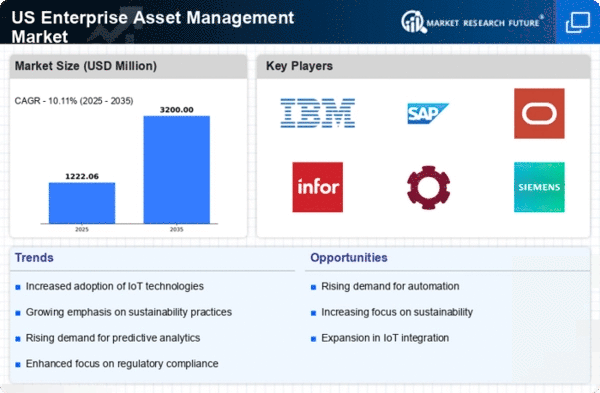Increased Focus on Risk Management
Risk management has become a critical driver in the enterprise asset-management market. Organizations are increasingly aware of the potential risks associated with asset management, including financial, operational, and compliance risks. As a result, there is a heightened focus on developing robust risk management frameworks that can identify, assess, and mitigate these risks effectively. The implementation of risk management strategies not only protects assets but also enhances overall organizational resilience. According to industry reports, companies that prioritize risk management can reduce asset-related losses by up to 25%. This trend indicates that the enterprise asset-management market is evolving to incorporate comprehensive risk management practices.
Rising Operational Costs and Efficiency Needs
The enterprise asset-management market is significantly influenced by rising operational costs and the pressing need for efficiency. Organizations are under constant pressure to optimize their asset performance while minimizing costs. This has led to an increased investment in asset management solutions that streamline operations and enhance productivity. For instance, companies that implement effective asset management practices can achieve cost savings of approximately 15% to 20%. As businesses seek to maintain competitiveness in a challenging economic environment, the demand for efficient asset management solutions is expected to grow, driving innovation and investment in the enterprise asset-management market.
Emphasis on Workforce Training and Development
The enterprise asset-management market is also being shaped by an emphasis on workforce training and development. As asset management systems become more complex, organizations recognize the importance of equipping their workforce with the necessary skills to utilize these systems effectively. Training programs focused on asset management best practices and technology usage are becoming increasingly prevalent. This investment in human capital is essential for maximizing the benefits of asset management solutions. Companies that prioritize workforce development can enhance employee productivity and engagement, leading to improved asset performance. Thus, the enterprise asset-management market is likely to see a continued focus on training initiatives.
Growing Demand for Data-Driven Decision Making
In the enterprise asset-management market, there is a growing emphasis on data-driven decision-making. Organizations are increasingly recognizing the value of data analytics in optimizing asset performance and reducing operational costs. The ability to analyze vast amounts of data allows companies to identify trends, forecast asset failures, and make informed investment decisions. Reports indicate that businesses leveraging data analytics can achieve a 20% improvement in asset utilization. This trend is further fueled by the need for transparency and accountability in asset management practices, as stakeholders demand more insights into asset performance. Consequently, the enterprise asset-management market is likely to see a continued shift towards data-centric strategies.
Technological Advancements in Asset Management
The enterprise asset-management market is experiencing a surge in technological advancements that enhance operational efficiency. Innovations such as artificial intelligence (AI) and machine learning (ML) are being integrated into asset management systems, allowing for predictive maintenance and improved decision-making. According to recent data, organizations that adopt these technologies can reduce maintenance costs by up to 30%. Furthermore, the increasing adoption of cloud-based solutions is facilitating real-time data access and collaboration among teams, which is crucial for effective asset management. As companies strive to optimize their asset utilization, these technological advancements are likely to play a pivotal role in shaping the future of the enterprise asset-management market.

















